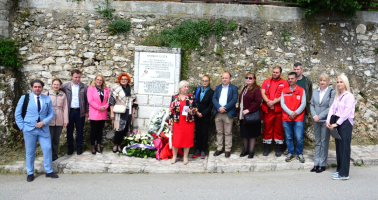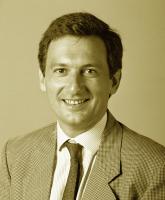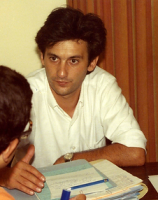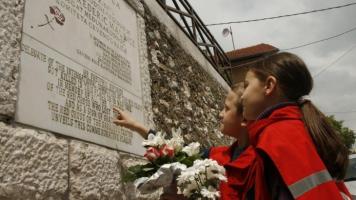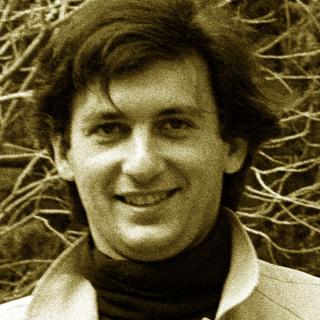Frédéric Maurice was born on 11 November 1953 in Geneva. His family moved to Boston in 1955 for his father’s job, and when they returned to Geneva in 1958 Frédéric was speaking English and French. He attended Collège Florimont for both grade school and high school, which he finished in 1972. After being exempted from military service for reasons of conscience, he studied law at the University of Geneva, graduating with a bachelor’s degree in 1976. At this point, he already envisioned a career in the humanitarian sphere.
Frédéric’s next move was abroad. He spent the winter of 1976–1977 in Berlin, where he took classes at the Free University. Then, from November 1977 to January 1979, he lived on a kibbutz in Israel. He wanted to see how he would fare living a simpler life centred on manual labour – his work consisted of irrigating orchards. This was his first visit to Israel, although he had travelled to Syria, Jordan and Lebanon several years earlier. Not one to miss an opportunity, Frédéric took advantage of his time in the Upper Galilee to study both written and literary Hebrew intensively, in part because he felt that would serve as a good basis for learning other Semitic languages, like Arabic. Once back in Geneva, Frédéric rounded out his studies with a diploma from the Graduate Institute of International and Development Studies, which he received in the summer of 1980.
Apart from his time on the kibbutz, Frédéric’s only work experience at this point in his life was as an assistant to Prof. Christian N. Robert at the University of Geneva’s law school. One of the results of that assistantship, which lasted from October 1976 to October 1977 (excluding the winter spent in Berlin), was a treatise that Frédéric wrote on euthanasia; it was published in 1978, with a preface by Prof. Robert. In 1980 Frédéric’s article “La loi, médiation de la violence” appeared in the journal Déviance et Société. These two texts provide a glimpse of the analytical powers and writing skills that he would draw on extensively in his work for the ICRC.
In July 1980, Frédéric applied for a job as a general delegate with the ICRC. During the hiring process, he was viewed as cultured, inquisitive, easygoing and straightforward. And despite his scant work experience, he was already looked on as a potential career employee.
For his first mission, Frédéric was sent to Jerusalem as a visiting delegate at the end of November 1980. He spent nearly a year and a half there, and his superiors found him to be smart, skilled and motivated. It was during this time that Frédéric got married – he and his wife had two children over the following four years. His next assignment was back at ICRC headquarters in Geneva, where he served as an operational delegate for the legal department. In that role his strong character and views came to the fore, as did his excellent writing skills.
Frédéric took a big step forward in his career when he was tapped to be the head of the ICRC’s delegation in Teheran starting in September 1983 in the midst of the war between Iran and Iraq. This was an extremely complex role. Frédéric was commended for his ability to stake out and defend the ICRC’s position, take courageous initiatives and rally his team. He also earned the respect of the individuals and entities he dealt with outside the ICRC – including the people the ICRC was there to protect. After returning to headquarters in November 1984 for a short spell, Frédéric was sent to Huambo, Angola, where he served as head of the ICRC’s subdelegation for six months at the height of the civil war there.
In October 1985, Frédéric started his second stint as head of delegation, this time in Addis Ababa, Ethiopia. The backdrop for this assignment was the conflict in the Ogaden region, although the delegation was also addressing the lingering effects of internal conflicts in neighbouring countries and a recent drought. When this posting came to an end in May 1987, Frédéric took some time off. He returned to work in September 1988 when he took up the position of head of delegation in Tel Aviv, which he held for just under two years.
In October 1990, Frédéric became the assistant director of operations back at ICRC headquarters. His tasks included representing the operations department in HQ working groups, drafting internal policy documents, preparing official ICRC documents for external use, helping hire and train new delegates and carrying out occasional field missions (e.g. needs assessments and operational support, in places like Kuwait, Iraq, Iran and Slovenia). It was on just such a mission, to Bosnia-Herzegovina, that Frédéric was killed. He had volunteered to replace the outgoing head of delegation in Sarajevo and, on 18 May 1992, was entering the city in an ICRC convoy. The clearly marked vehicles came under heavy fire, wounding Frédéric and two other ICRC staff members. While his two colleagues survived their injuries, Frédéric died the following day. He was 39 years old.
Frédéric was a complete humanitarian – one part theoretician and one part practitioner. In fully giving himself over to his vocation, he left a lasting impact on the ICRC, on his many colleagues over the years and, most importantly, on the victims of conflict in various parts of the world.
